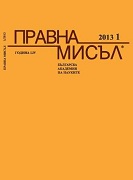Финансовият контрол като институт на българското финансово право
Financial control as an Institute of Bulgarian Financial Law
Author(s): Valery DimitrovSubject(s): Law, Constitution, Jurisprudence
Published by: Институт за държавата и правото - Българска академия на науките
Summary/Abstract: The study presents a piece of research work into the content and boundaries of the financial control, its relationship with the financial system and the financial law regulation, the types of financial control and the existence and functioning of the financial control system. The critical examination of the legal concept of finance and the theory of the financial system created by the great Bulgarian scholar – professor Miltcho Kostov – marks the beginning of the study. Prof. Kostov’s ideas has long lived methodological impact upon the contemporary financial law theory in Bulgaria and is a good starting point for establishing a reliable and long-term research framework. The content of the financial system and the scope of the financial law regulation in the context of market economy and democratic state represent a particular scientific interest. Any financial system coincides with the scope of financial law regulation and comprises several components: state budget and extra budget funds, municipal budgets and extra budget funds, social insurance and health insurance fund budgets, the budget of the central bank. The state budget is the integrating center of all these budgets balancing their receipts and spending through intra budget relations. Financial control is the control over the funds and the assets within the financial system but its scope goes beyond the reach of the financial system to encompass the different publicly assigned funds and assets. Financial control has a compound nature and consists of nine legally regulated kinds, as follows: financial inspection, tax and insurance audit and control, customs’ control, social insurance control, budget control exercised by the Minister of Finance, audit exerted by the National Audit Office, internal control as a part of financial management systems, internal audit and audit over the EU funds. The different kinds of financial control have been analyzed through the angle of the notion of the so called “controlling competence”. The competence includes a system of controlling powers, first to verify and prove and second to impact the behavior of the persons controlled. All kinds of control are specific by nature with well delineated ambits and complement one another. A conclusion has been drawn that the financial control system exists and functions with two integrating centers – the Minister of Finance and the National Audit Office.
Journal: Правна мисъл
- Issue Year: LIV/2013
- Issue No: 1
- Page Range: 32-73
- Page Count: 42
- Language: Bulgarian
- Content File-PDF

